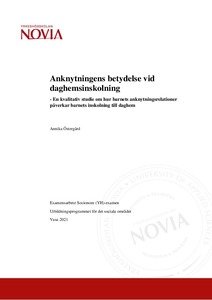Anknytningens betydelse vid daghemsinskolning: en kvalitativ studie om hur barnets anknytningsrelationer påverkar barnets inskolning till daghem
Östergård, Annika (2021)
Östergård, Annika
2021
All rights reserved. This publication is copyrighted. You may download, display and print it for Your own personal use. Commercial use is prohibited.
Julkaisun pysyvä osoite on
https://urn.fi/URN:NBN:fi:amk-2021052110351
https://urn.fi/URN:NBN:fi:amk-2021052110351
Tiivistelmä
Syftet med detta arbete är att undersöka hur barnets anknytningsrelation till sin förälder påverkar barnets daghemsinskolning. Centrala frågeställningar är vilken betydelse anknytningen har när barnet börjar på daghem, vilka anknytningsbehov som uppstår hos barnet, hur daghemspersonalen kan möta dessa behov, hur man som professionell kan se barnets anknytningsrelation, hur man som professionell skapar en anknytningsrelation till barnet och hur daghemspersonalen ser på anknytningen och dess betydelse.
Den teoretiska delen av arbetet behandlar anknytningsteorin, de olika anknytningsrelationerna och daghemsinskolning. Den andra delen av arbetet består av en undersökning som gjorts genom en kvalitativ enkät riktad till daghemspersonal för att få deras synpunkter på anknytning och daghemsinskolning.
Resultatet av denna undersökning visar att daghemspersonalen anser att anknytningen kan inverka vilka reaktioner och beteenden barnet visar när det börjar inskolningen till daghem, men att också många andra faktorer inverkar på detta. Det viktigaste enligt daghemspersonalen är att se varje barn som en unik individ och anpassa inskolningen efter barnets behov. The purpose of this Bachelor’s thesis is to investigate how the child’s attachment style to its parent affects how the child responds to starting day care. The question at issue addressed in this thesis are how attachment affects the start in day care, which attachment based needs arise in the child due to the start of day care, how the personnel can provide for these needs, how the personnel can determine which attachment style the child has, how the personnel creates an attachment relation to the child and how the personnel views the importance of attachment in day care.
The theoretical part of the thesis describes attachment theory, attachment and day care training. The second part of the thesis is an investigation conducted through a qualitative survey with day care personnel to get their opinions and experiences on the subject.
The result of this survey shows that attachment styles may play a part in how children react to starting day care. The day care personnel said that many other things also affect how the child responds to starting day care. The main thing according to the survey participants is to see each child as an unique individual with unique needs and to adapt the start of day care to suit each individual.
Den teoretiska delen av arbetet behandlar anknytningsteorin, de olika anknytningsrelationerna och daghemsinskolning. Den andra delen av arbetet består av en undersökning som gjorts genom en kvalitativ enkät riktad till daghemspersonal för att få deras synpunkter på anknytning och daghemsinskolning.
Resultatet av denna undersökning visar att daghemspersonalen anser att anknytningen kan inverka vilka reaktioner och beteenden barnet visar när det börjar inskolningen till daghem, men att också många andra faktorer inverkar på detta. Det viktigaste enligt daghemspersonalen är att se varje barn som en unik individ och anpassa inskolningen efter barnets behov.
The theoretical part of the thesis describes attachment theory, attachment and day care training. The second part of the thesis is an investigation conducted through a qualitative survey with day care personnel to get their opinions and experiences on the subject.
The result of this survey shows that attachment styles may play a part in how children react to starting day care. The day care personnel said that many other things also affect how the child responds to starting day care. The main thing according to the survey participants is to see each child as an unique individual with unique needs and to adapt the start of day care to suit each individual.
